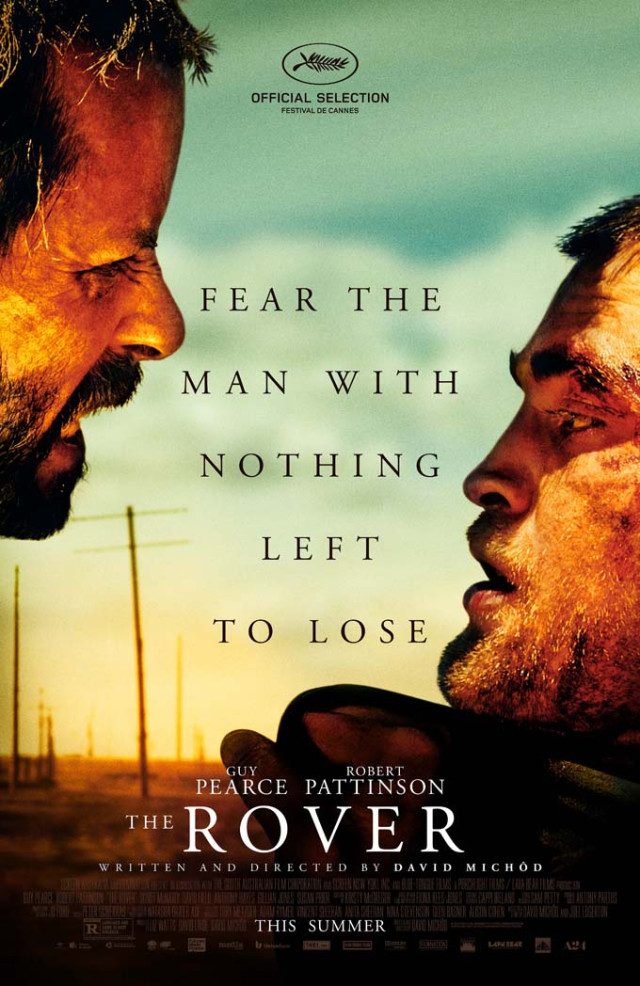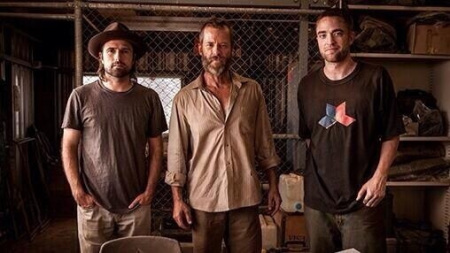Geo-Politics, Car Chases, and Keri Hilson Rhapsodies in 'The Rover'
 Friday, June 13, 2014 at 8:46PM
Friday, June 13, 2014 at 8:46PM  Glenn here looking at a film from my homeland. As I sat watching David Michôd’s The Rover surrounded by a room of American film critics, I began to think about politically-motivated cinema and how it is perceived by audiences who do not have a distinct knowledge of the subject at hand. Like many “new waves” that come about (which is basically a fancy term for “look, we’re finally paying attention to you!”), these films are usually the result of angry artists using their form to critique a government or regime. Some do it with unmistakable blunt force, while others take the allegorical road. In the case of The Rover, it’s the latter. So as I sat then more-or-less engrossed (more on that in a little bit) and admiring what Michôd was saying about Australian geopolitics (intentional or otherwise), I couldn’t help but think that – quite frankly – a lot of people aren’t going to get it.
Glenn here looking at a film from my homeland. As I sat watching David Michôd’s The Rover surrounded by a room of American film critics, I began to think about politically-motivated cinema and how it is perceived by audiences who do not have a distinct knowledge of the subject at hand. Like many “new waves” that come about (which is basically a fancy term for “look, we’re finally paying attention to you!”), these films are usually the result of angry artists using their form to critique a government or regime. Some do it with unmistakable blunt force, while others take the allegorical road. In the case of The Rover, it’s the latter. So as I sat then more-or-less engrossed (more on that in a little bit) and admiring what Michôd was saying about Australian geopolitics (intentional or otherwise), I couldn’t help but think that – quite frankly – a lot of people aren’t going to get it.
People that I asked seemed to be aware that the film was working on a level higher than mere outback action fodder, but would be hard-pressed to explain what it was all about. I don’t blame them – I wouldn’t want to follow Australian politics either right now if I weren’t personally invested in it. It's truly depressing. Furthermore, it’s not like I can claim to know the impetus behind any number of film movements, political or not. However, with The Rover I think it’s a tougher case to decipher because Michôd and his collaborators have made a very sparse film. These thoughts I was having came about during one of The Rover’s quieter scenes, of which where are many. It's film that surely could have been wound tighter in the editing room (although the work of newcomer editor Peter Sciberras is still effective, especially in the film’s impactful and exciting opening act) and perhaps a little more forthcoming with its details, if only to allow the international audiences that it’s bound to attract after the Oscar-nominated Animal Kingdom more of an access to its themes.
 Michôd, Pearce, & Pattinson on set of 'The Rover'
Michôd, Pearce, & Pattinson on set of 'The Rover'
I loved that way Michôd very casually introduced the setting – “Australia. Ten years after the collapse.” – and added layers of allegory on top of it. The way Australian money has become obsolete and been replaced by the almighty American dollar, referencing the way Australia is very quickly descending into an American model of hostile pro-capitalism. The way the land is representative of a society that has become too reliant on minerals and fossil fuels resulting in a dead and barren land. The way unemployment, lack of education, and massive homelessness will soon grip Australia thanks to a government that hates anybody who wasn’t born into wealth. Whether I am projecting onto it, who knows? But I see it, and like another recent Australian film, Greg McLean’s Wolf Creek 2, its themes are wrapped in a particularly grisly genre package.
The story of The Rover is incredibly simple: Guy Pearce plays a seemingly nomadic man whose car is stolen by outback thieves (including Scoot McNairy). He sets out to retrieve it with the help of one of the thieves’ brothers, played by Robert Pattinson in a twitchy, very nearly overworked performance that eventually pays off in the final act. The film more or less plays out as a series of vignettes as the two men, covered in thick, patchy sweat and red desert dust, come across various outback dwellers including Gillian Jones (a brilliant Australian character actress) who is incredible in her brief role as a grandma that holds secrets and villainous dread in her nimble fingers. She and others like Susan Prior and Anthony Hayes give the film sparks of energy when Pearce is busy being stoic and silent, and Pattinson is mumbling into the dirt.
 Gillian Jones in 'The Rover'
Gillian Jones in 'The Rover'
While The Rover lacks the narrative thrust of Animal Kingdom, it has potent things to say and allows Michôd to demonstrate a different set of filmmaking skills. Who would’ve guessed that he can film a car chase with such virility? And trading in the compact claustrophobia of the inner city for the vastness of the outback has allowed the director and his cinematographer Natasha Braier to craft some vivid, memorable images. I keep going back to that wonderfully orchestrated train sequence that so wonderfully utilises the widescreen, something that Braier also did so well in her work on The Milk of Sorrow. Or how about the shot, mere minutes into the film, where a car rolls silently by a large glass window as Pearce drinks at a bar blasting Japanese karaoke music. Genuine shot of the year contender right there, folks. And who would have thought Keri Hilson’s “Pretty Girl Rock” would make such a beautiful moment of bliss in a pseudo post-apocalyptic outback road movie?
The film's narrative sparseness surely dampens some of its drama, but in many ways it is a superior film to Animal Kingdom. It has more to say and says it in a more cinematic way. Many will hate it. I keep thinking of Andrew Dominik's Killing Them Softly in that regard. Even if all an audience sees is the story of a man and his rover, then there's much to admire.



Reader Comments (7)
"The way unemployment, lack of education, and massive homelessness will soon grip Australia thanks to a government that hates anybody who wasn’t born into wealth. Whether I am projecting onto it, who knows?"
I haven't seen the film yet so I can't comment too much. But the current government was only elected in September last year, and the true extent of their bone-headedness wasn't entirely clear until just a few weeks ago.
Even accounting for a rushed shoot and post-production (which, with a film like this, is unlikely), I really don't see how the screenplay for The Rover could've been written or even re-written after September of last year. So I think a lot of the political parallels might just be coincidental. Or at least, I doubt they were intended as an attack on the current government specifically.
Also there is no way Screen Australia would fund anything remotely attacking the current government. They're already getting funding cuts. They're terrified. And in Screen Aus's defence, the situation is rather terrifying. It's how censorship works in a contemporary democracy.
Thanks Glenn, interesting article. I'll be making an effort to check this one out. And I think it might play better around the world than you are thinking.
I'd have to concur with Goran in saying that I don't think that the film could be a response to the current government. Instead, I'd imagine the collapse is the recent global financial crisis which hit many countries a lot harder than Australia, leaving them already mired in the problems of unemployment, lack of education, and massive homelessness that you say Australia is looking forward to.
So, the Australian government may be bad but you can take comfort in (and then cry at) the fact that it is not uniquely so. In fact I was reminded strongly of the don't employ foreigners, employ Australians posters I saw during last year's Australian election campaign during the recent Euro campaigns by the likes of UKIP and Front National.
So, thanks globalism for allowing the films of David Michôd to resonate to a larger audience!
As someone who's admiration of Animal Kingdom grows with time (and I liked it a lot to begin with), I'm looking forward to this. Very well written commentary, Glenn. Hopefully you're wrong about it not appealing more broadly. There's few cinematic feelings as uninspiring knowing you're in the presence of greatness but that you (as a member of the audience) don't have the capacity to get it to the fullest extent.
Goran: I don't think a film with allegorical aspects has to be so grindingly literal to be read politically, does it? The forces that put certain styles of government into power are surely already present before they're elected, The themes Glenn points to here seem as much world-historical in origin as they are tied specific people/administrations; the locality comes in how they seem to impact certain places, and so they become resonant (or opaque) in different contexts. It sounds more like it was extrapolating a future along certain political themes that have become suddenly even more timely than perhaps the filmmakers even anticipated/feared. Which is different to me than a *coincidental* politicality.
I feel like the same kind of opacity in perception occurred with Jia Zhangke's 'Touch of Sin,' which was another recent film to politicize genre; North American critics seemed to sense that allegorical aspects existed, but they also seemed mystified by them.
Anyhow. Great piece, Glenn. I'm looking forward to this movie more now (and I loved Animal Kingdom, of course).
Goran, that's very true, and I even mentioned I may simply be projecting, but I think it's very easy to imagine a filmmaker seeing the potential consequences of future government (as seen played out in other parts of the world) and translating it to film. It's set in the future and there's every possibility that Michod (who wrote the screenplay based on an idea by Joel Edgerton) didn't expect the consequences of his imagined future to become so possible so quickly. He may have been writing it as a cautionary tale only to see it bloom into an entirely real possibility. That doesn't stop the film being able to be read as one thing or another.
I've just returned from viewing this visually magnificent and confronting 'post-apocalyptic' road film. Guy Pearce's performance as the relentless, grim, sociopath/psychopath ready to kill those who do (or would seek to do) him wrong is chillingly convincing. The South Australian settings, particularly those shot in the Flinders Rangers added to an 'end of the world' atmosphere. I've never seen Robert Pattinson's work before this production. I'm aware that some considered he was only cast to in order to trade on his 'Twilight' popularity. In my opinion, the probability that his TV fans will enjoy neither this film nor Pattinson's character in it is high.
Yeah, several times I having seen car stunts in action films. Car chase by Police is also a very common thing in films. Thanks for you article as it reminds me about such films where I have seen more of stunts and car chases. How To Save Money on Car Repair?